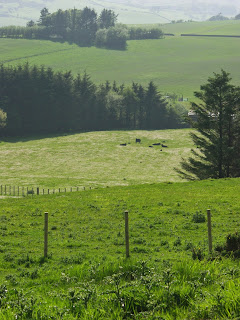 |
| Scotland's land. |
| OK, yes, it is my croft. |
The Right Solution
It remains my view that the right solution to Scotland's land problem is to apply a single, universal, to every square metre of Scotland, with the proceeds going to local government at a layer far closer to our current community councils than to our present regional councils. This taxation should be so progressive that it would essentially bankrupt all large estates immediately, causing them to surrender the vast majority of their land to those same councils, which would hold it as common.
These councils would be empowered to let parts of their common land to individuals on a , and to let parts to corporate entities on a maximum term of fifty years, but they would not be empowered to sell common land. At all. Ever.
However, for this solution to be implemented, we'd need a bold, far-sighted and progressive Scottish government, and there is at present no prospect of our ever having one. So we need to look for other solutions.
The Co-operative solution
So, let us suppose we set up a co-operative fund, called for the remainder of this document 'The Co-op Land Fund'. This fund would sell shareholdings to members of the public, who could put in any amount (over a set minimum of perhaps £100); but each member would get only one vote, irrespective of the amount of money they had put in.
There are two potential models for this:
The Co-op Land Fund could speculatively buy a parcel of land and invite proposals from people interested in forming management co-ops to manage/occupy it;
A nascent management co-op could approach the Co-op Land Fund and say 'there is this particular parcel of land which is now on the market, which we would like to manage/occupy, will you buy it and lease it to us.'
Obviously, the Co-op Land Fund could, and I hope would, operate both these models.
The idea here is that the management co-ops would either represent existing communities of place - a village would set up its own co-op to bid for land in its locality - or intentional communities which had the intention of becoming communities of place, by co-residing on the parcel of land which they leased.
Ideally, the management co-ops would hold the land more or less in perpetuity. They would pay a rental to the Co-op Land Fund, which could provide, in addition to finance for land, also finance for buildings and capital plant, and could also provide land management and ecological advice services.
Management co-ops should be essentially local, holding one parcel of land or at most a few parcels of land within easy cycling distance of one another. Everyone living on, or working on, the land held by a management co-op should be entitled to membership of that co-op.
In short, I view these management co-ops as being essentially something like Standingstone.
The Co-op Land Fund should set broad guidance for activities and developments which should be encouraged, should be discouraged, and should be disallowed, on these parcels of land; this guidance should generally be designed:
To maintain the land in good long-term ecological health;
As part of that, to sequester carbon;
To produce strategic goods including food, natural fibres, timber and electrical power;
No comments:
Post a Comment